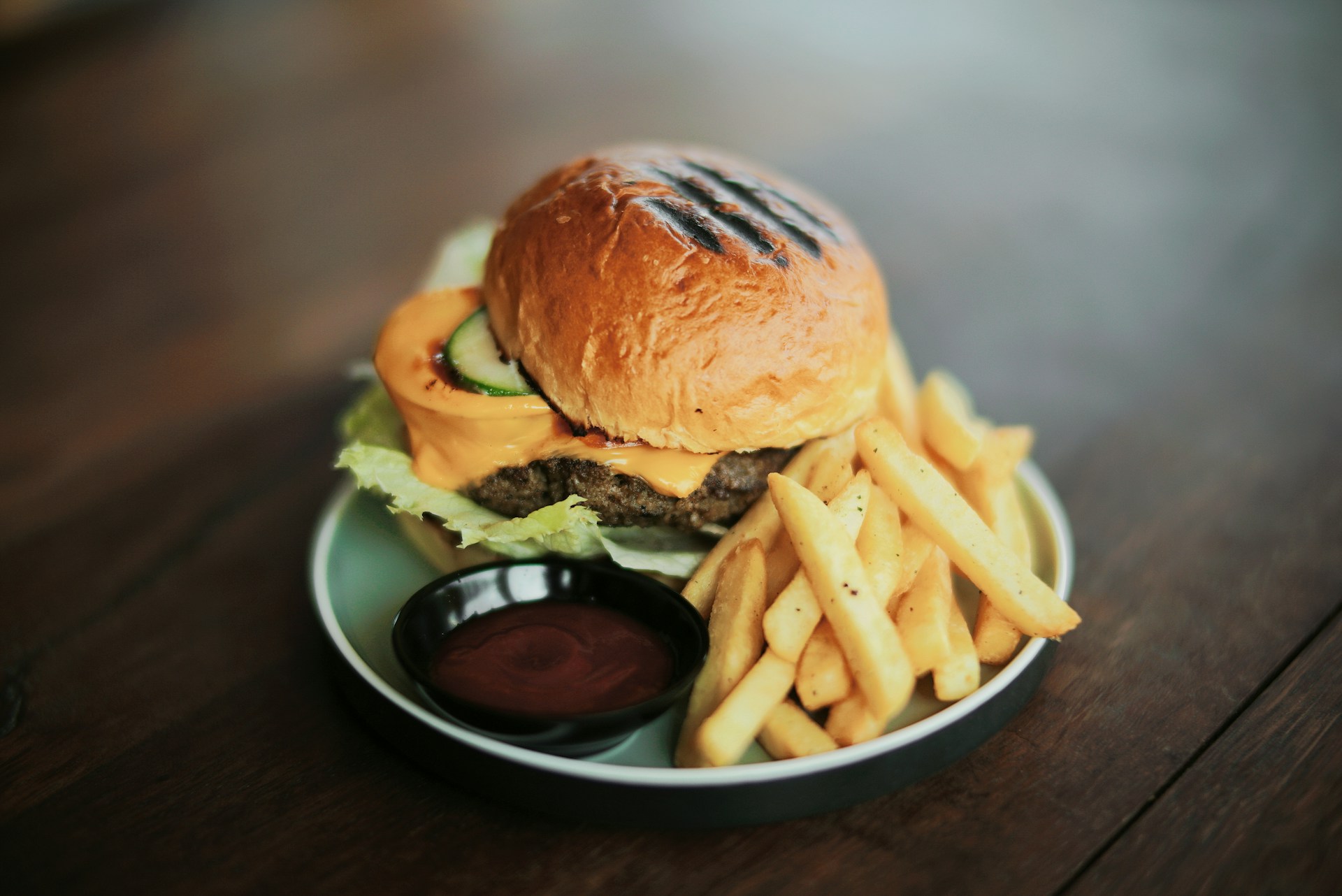Emotional Eating and Psychological Distress: Unveiling the Hidden Struggles of International Students in Surabaya
Makan secara Emosional dan Stres Psikologis: Mengungkap Perjuangan Tersembunyi Mahasiswa Internasional di Surabaya

Downloads
Background: International students often face significant adaptation challenges in new academic settings, leading to increased psychological stress, which may affect their emotional well-being and eating habits. Emotional eating is commonly triggered by stress and may contribute to the development of abdominal obesity, which is a serious health concern associated with a higher risk of metabolic and cardiovascular diseases.
Objectives: This study aims to examine the presence of psychological stress and the incidence of emotional eating among international students.
Methods: A cross-sectional study was conducted at Airlangga University in April 2024 with 130 international student respondents from a total of 165 international students recorded, who provided consent and met the inclusion criteria. Data were collected and analyzed descriptively, and statistical testing was conducted using Spearman’s correlation, setting the significance level at p-value <0.05.
Results: Most respondents were female (54.62%), undergraduate students (60.00%), Malaysians (57.70%), and had a median waist circumference of 82.59 cm. Psychological stress was associated with emotional eating behavior, as indicated by significant correlations between the subscales of depression, anxiety, and stress as well as the total Depression Anxiety Stress Scales (DASS) score and the total Dutch Eating Behavior Questionnaire Emotional Eating (EE) score (p <0.001).
Conclusions: International students experiencing psychological stress during their studies are more likely to engage in emotional eating behaviors, which can subsequently increase their potential for body size changes if not balanced with increased calorie burning.
. Sze, K. Y. P., Lee, E. K. P., Chan, R. H. W. & Kim, J. H. Prevalence of negative emotional eating and its associated psychosocial factors among urban Chinese undergraduates in Hong Kong: a cross-sectional study. BMC Public Health 21, (2021). https://doi.org/10.1186/s12889-021-10531-3
Caso, D., Capasso, M., Fabbricatore, R. & Conner, M. Unhealthy eating and academic stress: The moderating effect of eating style and BMI. Health Psychol Open 7, (2020). https://doi.org/10.1177/2055102920975274
Errisuriz, V. L., Pasch, K. E. & Perry, C. L. Perceived stress and dietary choices: The moderating role of stress management. Eat Behav 22, 211–216 (2016). https://doi.org/10.1016/j.eatbeh.2016.06.008
Sayih Belay, A., Guangul, M. M., Asmare, W. N. & Mesafint, G. Prevalence and Associated Factors of Psychological Distress among Nurses in Public Hospitals, Southwest, Ethiopia: A cross-sectional Study. J Health Sci 31, 1247 (2021). https://doi.org/10.4314/ejhs.v31i6.21
Viertiö, S. et al. Factors contributing to psychological distress in the working population, with a special reference to gender difference. BMC Public Health 21, (2021). https://doi.org/10.1186/s12889-021-10560-y
Bittencourt, T., Johnstone, C., Adjei, M. & Seithers, L. “We See the World Different Now”: Remapping Assumptions About International Student Adaptation. J Stud Int Educ 25, 35–50 (2021). https://doi.org/10.1177/1028315319861366
Pihkala, P. Eco-anxiety and environmental education. Sustainability (Switzerland) 12, 1–38 (2020). https://doi.org/10.3390/su122310149
Mofatteh, M. Risk factors associated with stress, anxiety, and depression among university undergraduate students. AIMS Public Health 8, 36–65 (2021). https://doi.org/10.3934/publichealth.2021004
Satici, B., Gocet-Tekin, E., Deniz, M. E. & Satici, S. A. Adaptation of the Fear of COVID-19 Scale: Its Association with Psychological Distress and Life Satisfaction in Turkey. Int J Ment Health Addict 19, 1980–1988 (2021). https://doi.org/10.1007/s11469-020-00294-0
Horwitz, A. V. Distinguishing distress from disorder as psychological outcomes of stressful social arrangements. Health N Hav 11, 273–289 (2007). https://doi.org/10.1177/1363459307077541
Konttinen, H. Emotional eating and obesity in adults: The role of depression, sleep and genes. in Proceedings of the Nutrition Society vol. 79 283–289 (Cambridge University Press, 2020). https://doi.org/10.1017/S0029665120000166
Konttinen, H., Van Strien, T., Männistö, S., Jousilahti, P. & Haukkala, A. Depression, emotional eating and long-term weight changes: A population-based prospective study. International Journal of Behavioral Nutrition and Physical Activity 16, (2019). https://doi.org/10.1186/s12966-019-0791-8
Cardi, V., Leppanen, J. & Treasure, J. The effects of negative and positive mood induction on eating behaviour: A meta-analysis of laboratory studies in the healthy population and eating and weight disorders. Neuroscience and Biobehavioral Reviews vol. 57 299–309 Preprint at https://doi.org/10.1016/j.neubiorev.2015.08.011 (2015). https://doi.org/10.1016/j.neubiorev.2015.08.011
Arjmand, E. J. et al. Changes in Body Mass Index and Their Associations with Psychological Distress, Worries, and Emotional Eating during the COVID-19 Pandemic: A Norwegian Cohort Study. Nutrients 15, (2023). https://doi.org/10.3390/nu15173834
Barnhart, W. R., Braden, A. L. & Price, E. Emotion regulation difficulties interact with negative, not positive, emotional eating to strengthen relationships with disordered eating: An exploratory study. Appetite 158, (2021). https://doi.org/10.1016/j.appet.2020.105038
Sultson, H., Kukk, K. & Akkermann, K. Positive and negative emotional eating have different associations with overeating and binge eating: Construction and validation of the Positive-Negative Emotional Eating Scale. Appetite 116, 423–430 (2017). https://doi.org/10.1016/j.appet.2017.05.035
Rosário, R., Llanaj, E., Barbeau, K. & Kim, Y. Psychosocial Stress Accompanied by an Unhealthy Eating Behavior Is Associated with Abdominal Obesity in Korean Adults: A Community-Based Prospective Cohort Study.
Markey, C. H. et al. A survey of eating styles in eight countries: Examining restrained, emotional, intuitive eating and their correlates. Br J Health Psychol 28, 136–155 (2023). https://doi.org/10.1111/bjhp.12616
Rachmawati, Y. & Anantanyu, S. Emotional eating, snacking behavior and nutritional status among adolescents. International Journal of Public Health Science (IJPHS) 8, 413–418 (2019). https://doi.org/10.11591/ijphs.v8i4.20398
Lovibond, P. F. & Lovibond, S. H. The Structure of Negative Emotional States: Comparison Of The Depression Anxiety Stress Scales (Dass) With The Beck Depression And Anxiety Inventories. BehaP. Res. Ther vol. 33 (1995). https://doi.org/10.1037/t01004-000
Guerrini-Usubini, A. et al. The interplay between emotion dysregulation, psychological distress, emotional eating, and weight status: A path model. International Journal of Clinical and Health Psychology 23, (2023). https://doi.org/10.1016/j.ijchp.2022.100338
van Strien, T., Frijters, J. E., Bergers, G. P. & Defares, P. B. The Dutch Eating Behavior Questionnaire (DEBQ) for Assessment of Restrained, Emotional, and External Eating Behavior. International lournat of Eating Disorders vol. 5 (1986). https://doi.org/10.1037/t04580-000
Sze, K. Y. P., Lee, E. K. P., Chan, R. H. W. & Kim, J. H. Prevalence of negative emotional eating and its associated psychosocial factors among urban Chinese undergraduates in Hong Kong: a cross-sectional study. BMC Public Health 21, (2021). https://doi.org/10.1186/s12889-021-10531-3
Gill, D. et al. Risk factors mediating the effect of body mass index and waist-to-hip ratio on cardiovascular outcomes: Mendelian randomization analysis. Int J Obes 45, 1428–1438 (2021). https://doi.org/10.1038/s41366-021-00807-4
Bugge, A. et al. Associations between waist circumference, metabolic risk and executive function in adolescents: A cross-sectional mediation analysis. PLoS One 13, (2018). https://doi.org/10.1371/journal.pone.0199281
Kim, K. S. et al. Reappraisal of waist circumference cutoff value according to general obesity. Nutr Metab (Lond) 13, (2016). https://doi.org/10.1186/s12986-016-0085-y
Pidgeon, A., Lacota, K. & Champion, J. The moderating effects of mindfulness on psychological distress and emotional eating behaviour. Aust Psychol 48, 262–269 (2013). https://doi.org/10.1111/j.1742-9544.2012.00091.x
Geller, S. et al. Body image, emotional eating and psychological distress among bariatric surgery candidates in Israel and the United States. Nutrients 12, (2020). https://doi.org/10.3390/nu12020490
Wijnant, K. et al. Stress responsiveness and emotional eating depend on youngsters’ chronic stress level and overweight. Nutrients 13, (2021). https://doi.org/10.3390/nu13103654
Betancourt-Núñez, A. et al. Emotional Eating and Dietary Patterns: Reflecting Food Choices in People with and without Abdominal Obesity. Nutrients 14, (2022). https://doi.org/10.3390/nu14071371
Saccaro, L. F. et al. Emotional Regulation Underlies Gender Differences in Pathological Eating Behavior Styles of Bariatric Surgery Candidates. Women 3, 189–199 (2023). https://doi.org/10.3390/women3020015
Motsa, T. N. Ethnic Differences in the Way College Students Cope with Stress. https://thekeep.eiu.edu/theses/4956.
Chao, A. M., Jastreboff, A. M., White, M. A., Grilo, C. M. & Sinha, R. Stress, cortisol, and other appetite-related hormones: Prospective prediction of 6-month changes in food cravings and weight. Obesity 25, 713–720 (2017). https://doi.org/10.1002/oby.21790
Charmandari, E., Tsigos, C. & Chrousos, G. Endocrinology of the stress response. Annual Review of Physiology vol. 67 259–284 Preprint at https://doi.org/10.1146/annurev.physiol.67.040403.120816 (2005). https://doi.org/10.1146/annurev.physiol.67.040403.120816
Kuckuck, S. et al. Glucocorticoids, stress and eating: The mediating role of appetite-regulating hormones. Obesity Reviews vol. 24 Preprint at https://doi.org/10.1111/obr.13539 (2023). https://doi.org/10.1111/obr.13539
García-Oropesa, E. M. et al. Effect of Insulin Resistance on Abdominal Obesity, Liver Fat Infiltration, and Body Mass Index in Youngsters: Body fat and liver elastography in Youth. Arch Med Res 54, (2023). https://doi.org/10.1016/j.arcmed.2023.102873
Tomiyama, A. J. et al. Leptin concentrations in response to acute stress predict subsequent intake of comfort foods. Physiol Behav 107, 34–39 (2012). https://doi.org/10.1016/j.physbeh.2012.04.021
Zhu, Y. et al. Psychological distress and metabolomic markers: A systematic review of posttraumatic stress disorder, anxiety, and subclinical distress. Neuroscience and Biobehavioral Reviews vol. 143 Preprint at https://doi.org/10.1016/j.neubiorev.2022.104954 (2022). https://doi.org/10.1016/j.neubiorev.2022.104954
He, Z. H., Li, M. De, Liu, C. J. & Ma, X. Y. Relationship between body image, anxiety, food-specific inhibitory control, and emotional eating in young women with abdominal obesity: a comparative cross-sectional study. Archives of Public Health 79, (2021). https://doi.org/10.1186/s13690-021-00526-2
Chami, R., Monteleone, A. M., Treasure, J. & Monteleone, P. Stress hormones and eating disorders. Molecular and Cellular Endocrinology vol. 497 Preprint at https://doi.org/10.1016/j.mce.2018.12.009 (2019). https://doi.org/10.1016/j.mce.2018.12.009
Perry, R. J. et al. Leptin’s hunger-suppressing effects are mediated by the hypothalamic–pituitary–adrenocortical axis in rodents. Proc Natl Acad Sci U S A 116, 13670–13679 (2019). https://doi.org/10.1073/pnas.1901795116
Bouillon-Minois, J. B. et al. Leptin as a biomarker of stress: A systematic review and meta-analysis. Nutrients vol. 13 Preprint at https://doi.org/10.3390/nu13103350 (2021). https://doi.org/10.3390/nu13103350
Bell, B. M. et al. The mediating role of emotional eating in the relationship between perceived stress and dietary intake quality in Hispanic/Latino adolescents. Eat Behav 42, (2021). https://doi.org/10.1016/j.eatbeh.2021.101537
Al-Hussaniy, H. A., Alburghaif, A. H. & Naji, M. A. Leptin hormone and its effectiveness in reproduction, metabolism, immunity, diabetes, hopes and ambitions. Journal of Medicine and Life vol. 14 600–605 Preprint at https://doi.org/10.25122/jml-2021-0153 (2021). https://doi.org/10.25122/jml-2021-0153
Al-Hussaniy, H. A., Alburghaif, A. H. & Naji, M. A. Leptin hormone and its effectiveness in reproduction, metabolism, immunity, diabetes, hopes and ambitions. Journal of Medicine and Life vol. 14 600–605 Preprint at https://doi.org/10.25122/jml-2021-0153 (2021). https://doi.org/10.25122/jml-2021-0153
Betancourt-Núñez, A. et al. Emotional Eating and Dietary Patterns: Reflecting Food Choices in People with and without Abdominal Obesity. Nutrients 14, (2022). https://doi.org/10.3390/nu14071371
Copyright (c) 2024 Amerta Nutrition

This work is licensed under a Creative Commons Attribution-ShareAlike 4.0 International License.
AMERTA NUTR by Unair is licensed under a Creative Commons Attribution-ShareAlike 4.0 International License.
1. The journal allows the author to hold the copyright of the article without restrictions.
2. The journal allows the author(s) to retain publishing rights without restrictions
3. The legal formal aspect of journal publication accessibility refers to Creative Commons Attribution Share-Alike (CC BY-SA).
4. The Creative Commons Attribution Share-Alike (CC BY-SA) license allows re-distribution and re-use of a licensed work on the conditions that the creator is appropriately credited and that any derivative work is made available under "the same, similar or a compatible license”. Other than the conditions mentioned above, the editorial board is not responsible for copyright violation.












































